Exploring Cheating in Sports: A Sociological Analysis of Motivations
VerifiedAdded on 2023/06/08
|7
|1587
|304
Essay
AI Summary
This essay delves into the pervasive issue of cheating in sports, examining the sociological factors that drive both coaches and athletes to engage in unethical behavior. It begins by defining cheating within the context of sports, highlighting the violation of rules and norms for personal gain. The essay explores the motivations behind cheating, such as the pressure to win, financial incentives, and the pursuit of fame, while also referencing real-world examples like Lance Armstrong's doping scandal and the Spanish Basketball Team's Paralympics fraud. It emphasizes the role of coaches in setting ethical standards and the societal impact of cheating on the integrity of sports. The essay concludes by asserting that cheating in sports is a complex issue rooted in societal values and the pursuit of success at any cost, advocating for a deeper understanding of these factors to address the problem effectively. Desklib provides access to this and many other essays for academic support.
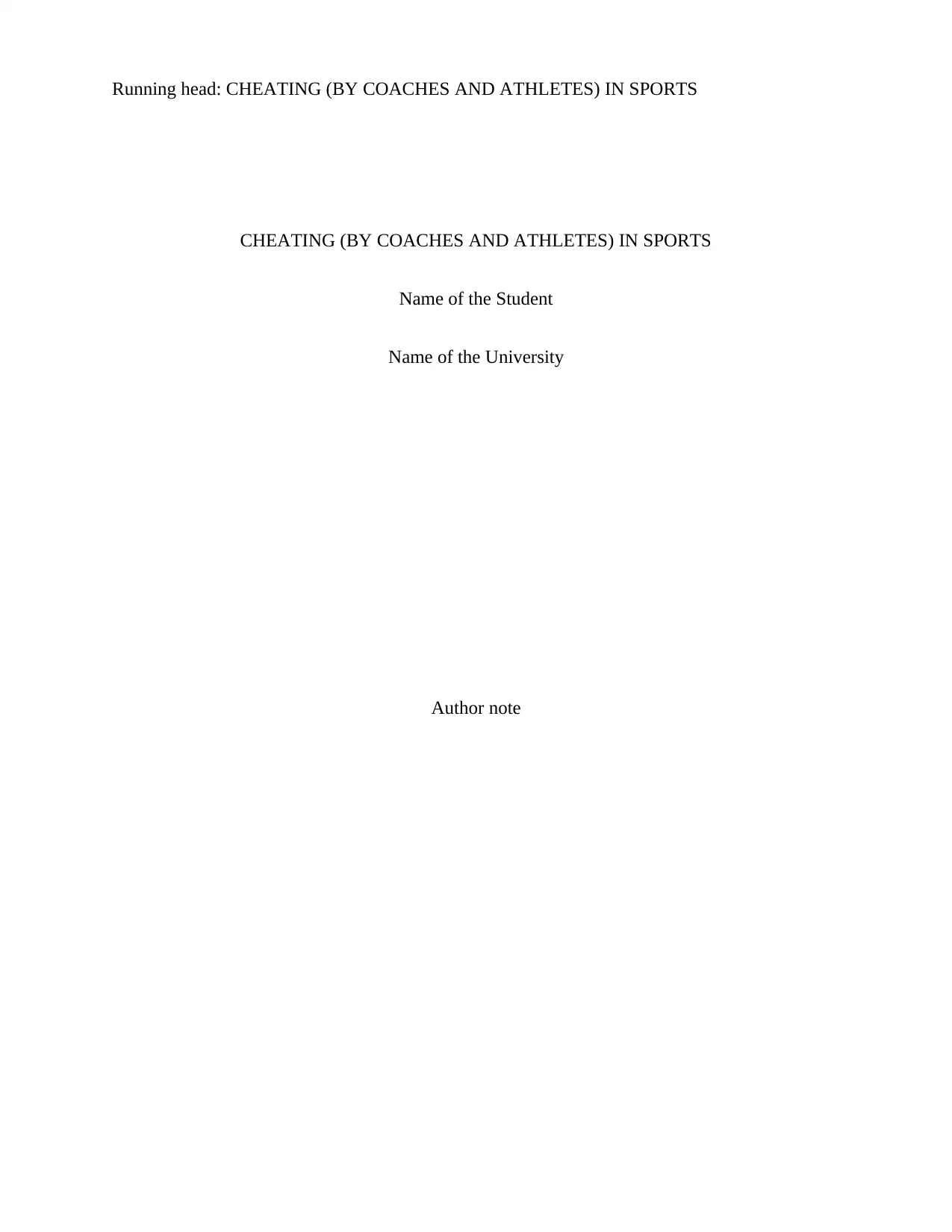
Running head: CHEATING (BY COACHES AND ATHLETES) IN SPORTS
CHEATING (BY COACHES AND ATHLETES) IN SPORTS
Name of the Student
Name of the University
Author note
CHEATING (BY COACHES AND ATHLETES) IN SPORTS
Name of the Student
Name of the University
Author note
Paraphrase This Document
Need a fresh take? Get an instant paraphrase of this document with our AI Paraphraser
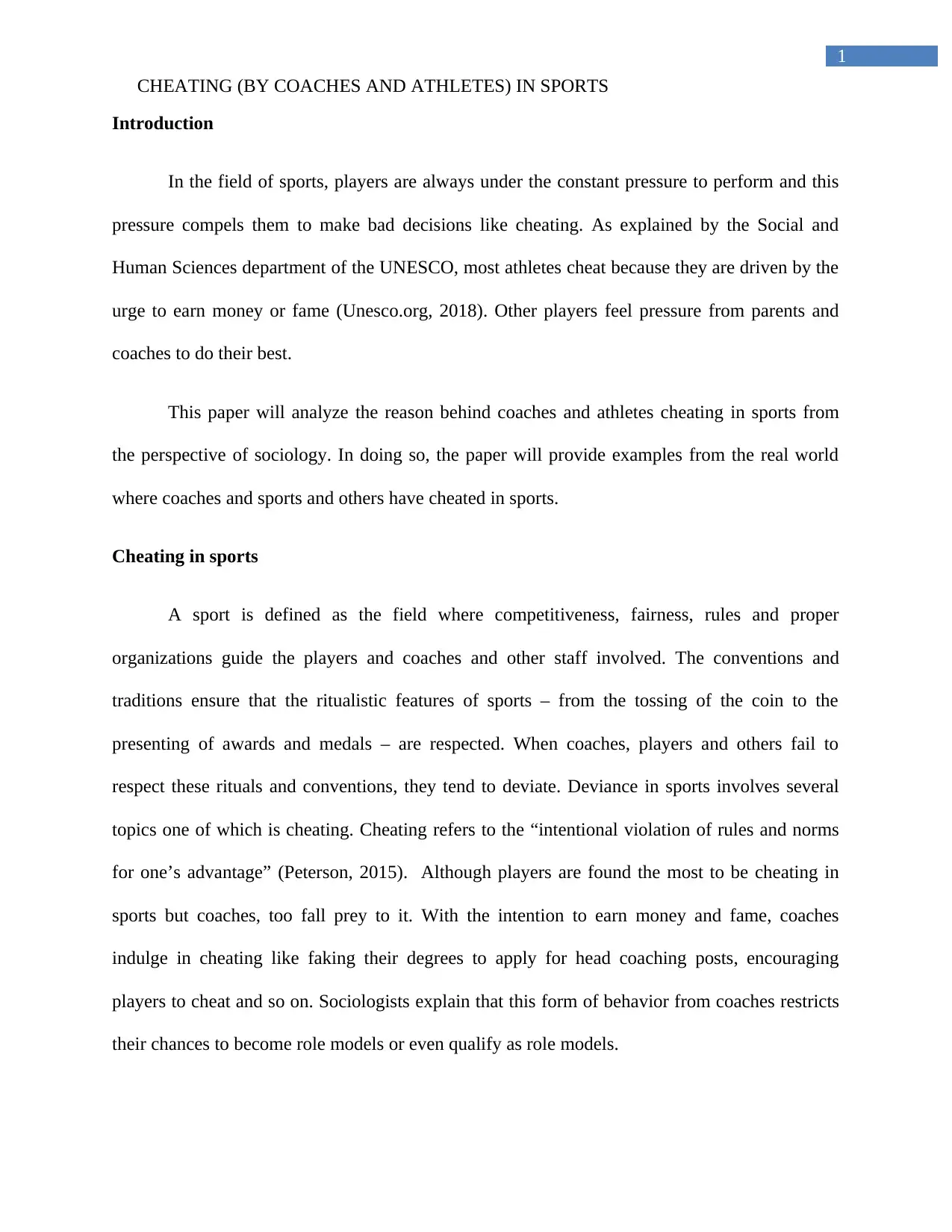
1
CHEATING (BY COACHES AND ATHLETES) IN SPORTS
Introduction
In the field of sports, players are always under the constant pressure to perform and this
pressure compels them to make bad decisions like cheating. As explained by the Social and
Human Sciences department of the UNESCO, most athletes cheat because they are driven by the
urge to earn money or fame (Unesco.org, 2018). Other players feel pressure from parents and
coaches to do their best.
This paper will analyze the reason behind coaches and athletes cheating in sports from
the perspective of sociology. In doing so, the paper will provide examples from the real world
where coaches and sports and others have cheated in sports.
Cheating in sports
A sport is defined as the field where competitiveness, fairness, rules and proper
organizations guide the players and coaches and other staff involved. The conventions and
traditions ensure that the ritualistic features of sports – from the tossing of the coin to the
presenting of awards and medals – are respected. When coaches, players and others fail to
respect these rituals and conventions, they tend to deviate. Deviance in sports involves several
topics one of which is cheating. Cheating refers to the “intentional violation of rules and norms
for one’s advantage” (Peterson, 2015). Although players are found the most to be cheating in
sports but coaches, too fall prey to it. With the intention to earn money and fame, coaches
indulge in cheating like faking their degrees to apply for head coaching posts, encouraging
players to cheat and so on. Sociologists explain that this form of behavior from coaches restricts
their chances to become role models or even qualify as role models.
CHEATING (BY COACHES AND ATHLETES) IN SPORTS
Introduction
In the field of sports, players are always under the constant pressure to perform and this
pressure compels them to make bad decisions like cheating. As explained by the Social and
Human Sciences department of the UNESCO, most athletes cheat because they are driven by the
urge to earn money or fame (Unesco.org, 2018). Other players feel pressure from parents and
coaches to do their best.
This paper will analyze the reason behind coaches and athletes cheating in sports from
the perspective of sociology. In doing so, the paper will provide examples from the real world
where coaches and sports and others have cheated in sports.
Cheating in sports
A sport is defined as the field where competitiveness, fairness, rules and proper
organizations guide the players and coaches and other staff involved. The conventions and
traditions ensure that the ritualistic features of sports – from the tossing of the coin to the
presenting of awards and medals – are respected. When coaches, players and others fail to
respect these rituals and conventions, they tend to deviate. Deviance in sports involves several
topics one of which is cheating. Cheating refers to the “intentional violation of rules and norms
for one’s advantage” (Peterson, 2015). Although players are found the most to be cheating in
sports but coaches, too fall prey to it. With the intention to earn money and fame, coaches
indulge in cheating like faking their degrees to apply for head coaching posts, encouraging
players to cheat and so on. Sociologists explain that this form of behavior from coaches restricts
their chances to become role models or even qualify as role models.
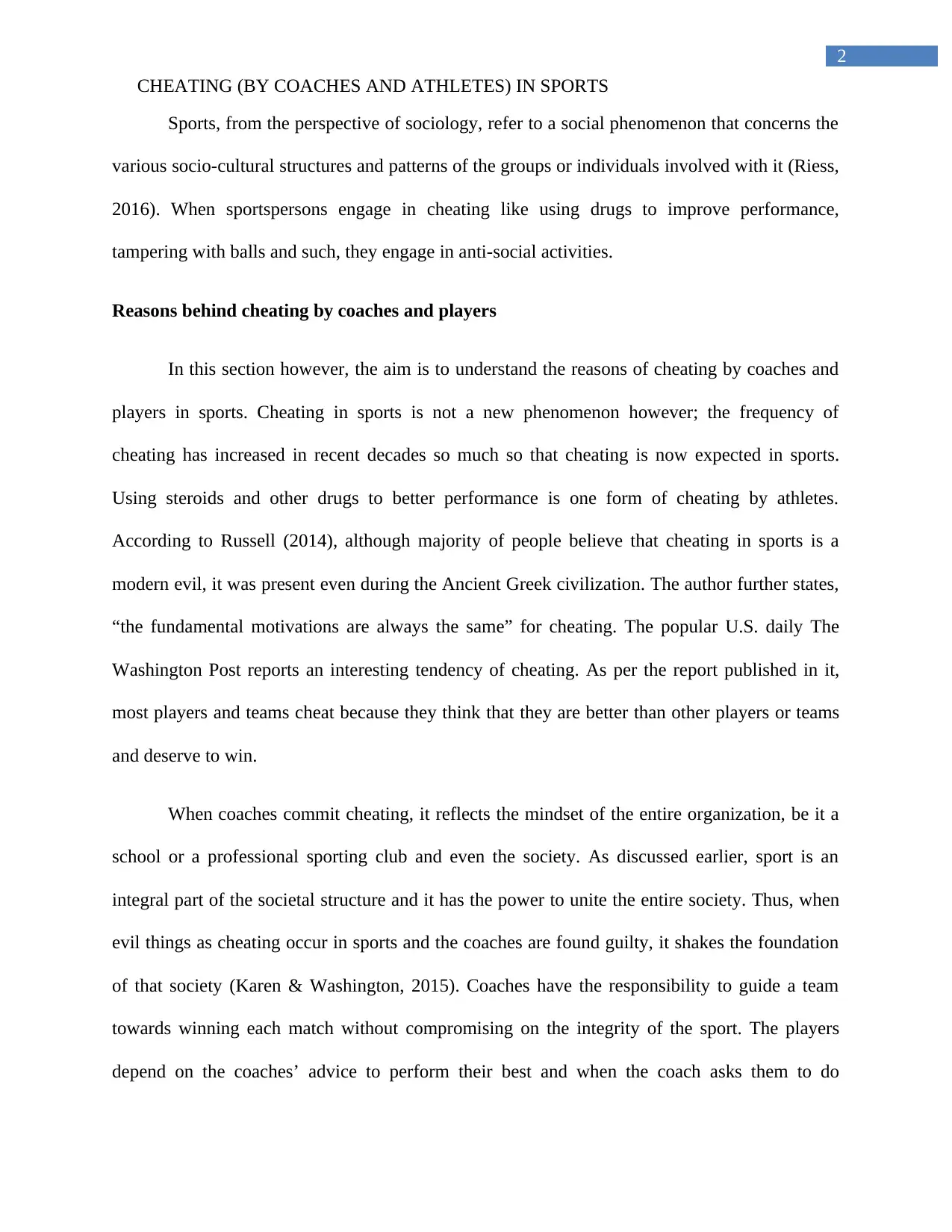
2
CHEATING (BY COACHES AND ATHLETES) IN SPORTS
Sports, from the perspective of sociology, refer to a social phenomenon that concerns the
various socio-cultural structures and patterns of the groups or individuals involved with it (Riess,
2016). When sportspersons engage in cheating like using drugs to improve performance,
tampering with balls and such, they engage in anti-social activities.
Reasons behind cheating by coaches and players
In this section however, the aim is to understand the reasons of cheating by coaches and
players in sports. Cheating in sports is not a new phenomenon however; the frequency of
cheating has increased in recent decades so much so that cheating is now expected in sports.
Using steroids and other drugs to better performance is one form of cheating by athletes.
According to Russell (2014), although majority of people believe that cheating in sports is a
modern evil, it was present even during the Ancient Greek civilization. The author further states,
“the fundamental motivations are always the same” for cheating. The popular U.S. daily The
Washington Post reports an interesting tendency of cheating. As per the report published in it,
most players and teams cheat because they think that they are better than other players or teams
and deserve to win.
When coaches commit cheating, it reflects the mindset of the entire organization, be it a
school or a professional sporting club and even the society. As discussed earlier, sport is an
integral part of the societal structure and it has the power to unite the entire society. Thus, when
evil things as cheating occur in sports and the coaches are found guilty, it shakes the foundation
of that society (Karen & Washington, 2015). Coaches have the responsibility to guide a team
towards winning each match without compromising on the integrity of the sport. The players
depend on the coaches’ advice to perform their best and when the coach asks them to do
CHEATING (BY COACHES AND ATHLETES) IN SPORTS
Sports, from the perspective of sociology, refer to a social phenomenon that concerns the
various socio-cultural structures and patterns of the groups or individuals involved with it (Riess,
2016). When sportspersons engage in cheating like using drugs to improve performance,
tampering with balls and such, they engage in anti-social activities.
Reasons behind cheating by coaches and players
In this section however, the aim is to understand the reasons of cheating by coaches and
players in sports. Cheating in sports is not a new phenomenon however; the frequency of
cheating has increased in recent decades so much so that cheating is now expected in sports.
Using steroids and other drugs to better performance is one form of cheating by athletes.
According to Russell (2014), although majority of people believe that cheating in sports is a
modern evil, it was present even during the Ancient Greek civilization. The author further states,
“the fundamental motivations are always the same” for cheating. The popular U.S. daily The
Washington Post reports an interesting tendency of cheating. As per the report published in it,
most players and teams cheat because they think that they are better than other players or teams
and deserve to win.
When coaches commit cheating, it reflects the mindset of the entire organization, be it a
school or a professional sporting club and even the society. As discussed earlier, sport is an
integral part of the societal structure and it has the power to unite the entire society. Thus, when
evil things as cheating occur in sports and the coaches are found guilty, it shakes the foundation
of that society (Karen & Washington, 2015). Coaches have the responsibility to guide a team
towards winning each match without compromising on the integrity of the sport. The players
depend on the coaches’ advice to perform their best and when the coach asks them to do
⊘ This is a preview!⊘
Do you want full access?
Subscribe today to unlock all pages.

Trusted by 1+ million students worldwide
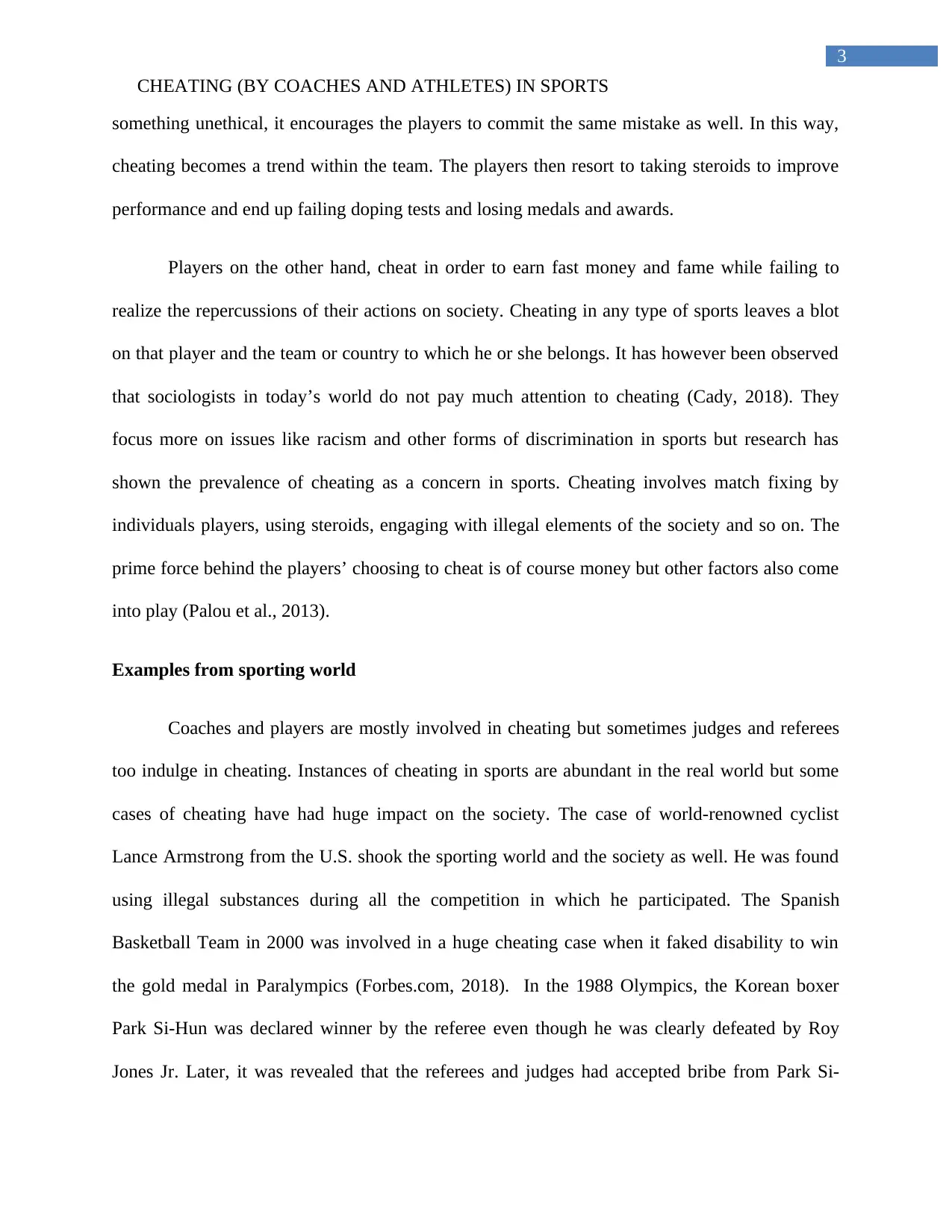
3
CHEATING (BY COACHES AND ATHLETES) IN SPORTS
something unethical, it encourages the players to commit the same mistake as well. In this way,
cheating becomes a trend within the team. The players then resort to taking steroids to improve
performance and end up failing doping tests and losing medals and awards.
Players on the other hand, cheat in order to earn fast money and fame while failing to
realize the repercussions of their actions on society. Cheating in any type of sports leaves a blot
on that player and the team or country to which he or she belongs. It has however been observed
that sociologists in today’s world do not pay much attention to cheating (Cady, 2018). They
focus more on issues like racism and other forms of discrimination in sports but research has
shown the prevalence of cheating as a concern in sports. Cheating involves match fixing by
individuals players, using steroids, engaging with illegal elements of the society and so on. The
prime force behind the players’ choosing to cheat is of course money but other factors also come
into play (Palou et al., 2013).
Examples from sporting world
Coaches and players are mostly involved in cheating but sometimes judges and referees
too indulge in cheating. Instances of cheating in sports are abundant in the real world but some
cases of cheating have had huge impact on the society. The case of world-renowned cyclist
Lance Armstrong from the U.S. shook the sporting world and the society as well. He was found
using illegal substances during all the competition in which he participated. The Spanish
Basketball Team in 2000 was involved in a huge cheating case when it faked disability to win
the gold medal in Paralympics (Forbes.com, 2018). In the 1988 Olympics, the Korean boxer
Park Si-Hun was declared winner by the referee even though he was clearly defeated by Roy
Jones Jr. Later, it was revealed that the referees and judges had accepted bribe from Park Si-
CHEATING (BY COACHES AND ATHLETES) IN SPORTS
something unethical, it encourages the players to commit the same mistake as well. In this way,
cheating becomes a trend within the team. The players then resort to taking steroids to improve
performance and end up failing doping tests and losing medals and awards.
Players on the other hand, cheat in order to earn fast money and fame while failing to
realize the repercussions of their actions on society. Cheating in any type of sports leaves a blot
on that player and the team or country to which he or she belongs. It has however been observed
that sociologists in today’s world do not pay much attention to cheating (Cady, 2018). They
focus more on issues like racism and other forms of discrimination in sports but research has
shown the prevalence of cheating as a concern in sports. Cheating involves match fixing by
individuals players, using steroids, engaging with illegal elements of the society and so on. The
prime force behind the players’ choosing to cheat is of course money but other factors also come
into play (Palou et al., 2013).
Examples from sporting world
Coaches and players are mostly involved in cheating but sometimes judges and referees
too indulge in cheating. Instances of cheating in sports are abundant in the real world but some
cases of cheating have had huge impact on the society. The case of world-renowned cyclist
Lance Armstrong from the U.S. shook the sporting world and the society as well. He was found
using illegal substances during all the competition in which he participated. The Spanish
Basketball Team in 2000 was involved in a huge cheating case when it faked disability to win
the gold medal in Paralympics (Forbes.com, 2018). In the 1988 Olympics, the Korean boxer
Park Si-Hun was declared winner by the referee even though he was clearly defeated by Roy
Jones Jr. Later, it was revealed that the referees and judges had accepted bribe from Park Si-
Paraphrase This Document
Need a fresh take? Get an instant paraphrase of this document with our AI Paraphraser
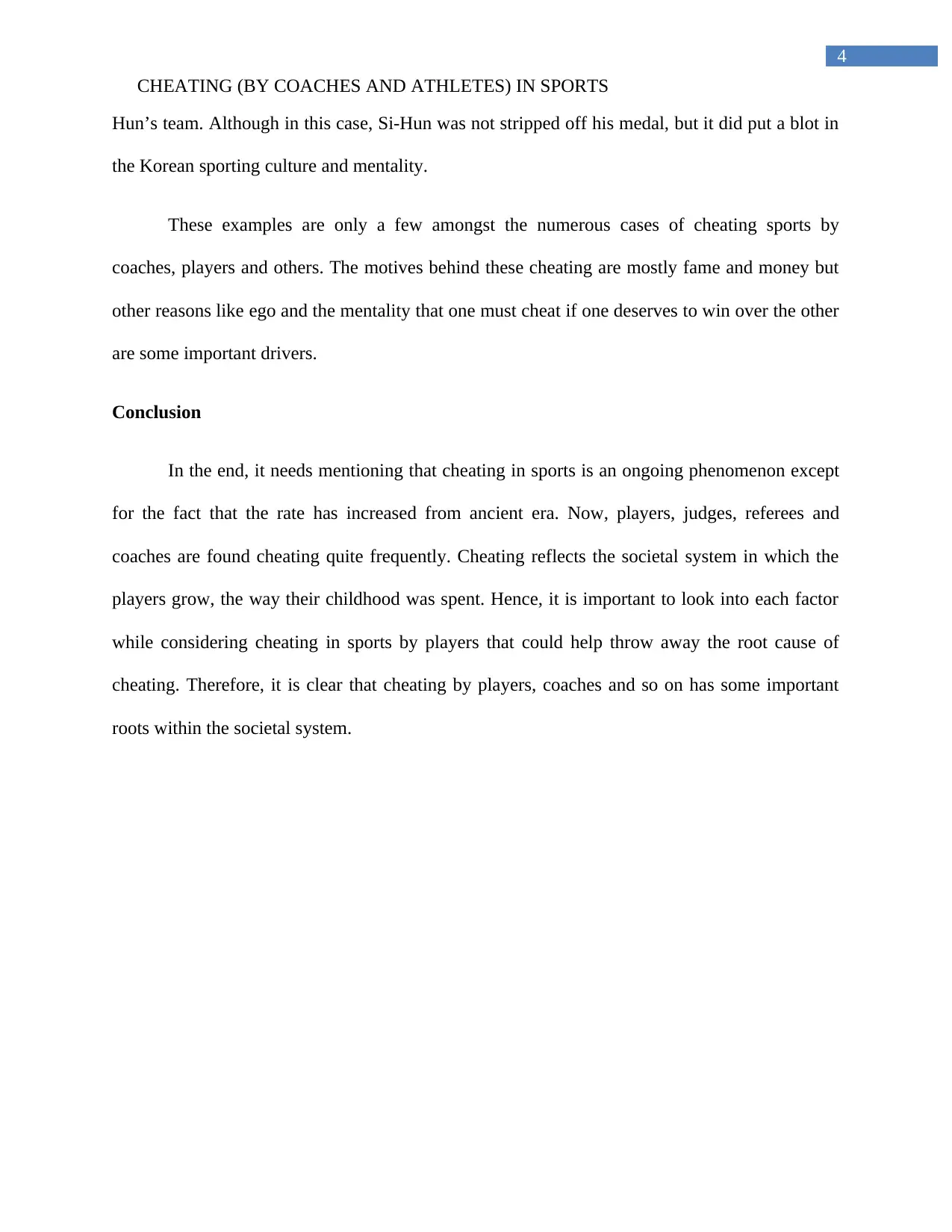
4
CHEATING (BY COACHES AND ATHLETES) IN SPORTS
Hun’s team. Although in this case, Si-Hun was not stripped off his medal, but it did put a blot in
the Korean sporting culture and mentality.
These examples are only a few amongst the numerous cases of cheating sports by
coaches, players and others. The motives behind these cheating are mostly fame and money but
other reasons like ego and the mentality that one must cheat if one deserves to win over the other
are some important drivers.
Conclusion
In the end, it needs mentioning that cheating in sports is an ongoing phenomenon except
for the fact that the rate has increased from ancient era. Now, players, judges, referees and
coaches are found cheating quite frequently. Cheating reflects the societal system in which the
players grow, the way their childhood was spent. Hence, it is important to look into each factor
while considering cheating in sports by players that could help throw away the root cause of
cheating. Therefore, it is clear that cheating by players, coaches and so on has some important
roots within the societal system.
CHEATING (BY COACHES AND ATHLETES) IN SPORTS
Hun’s team. Although in this case, Si-Hun was not stripped off his medal, but it did put a blot in
the Korean sporting culture and mentality.
These examples are only a few amongst the numerous cases of cheating sports by
coaches, players and others. The motives behind these cheating are mostly fame and money but
other reasons like ego and the mentality that one must cheat if one deserves to win over the other
are some important drivers.
Conclusion
In the end, it needs mentioning that cheating in sports is an ongoing phenomenon except
for the fact that the rate has increased from ancient era. Now, players, judges, referees and
coaches are found cheating quite frequently. Cheating reflects the societal system in which the
players grow, the way their childhood was spent. Hence, it is important to look into each factor
while considering cheating in sports by players that could help throw away the root cause of
cheating. Therefore, it is clear that cheating by players, coaches and so on has some important
roots within the societal system.
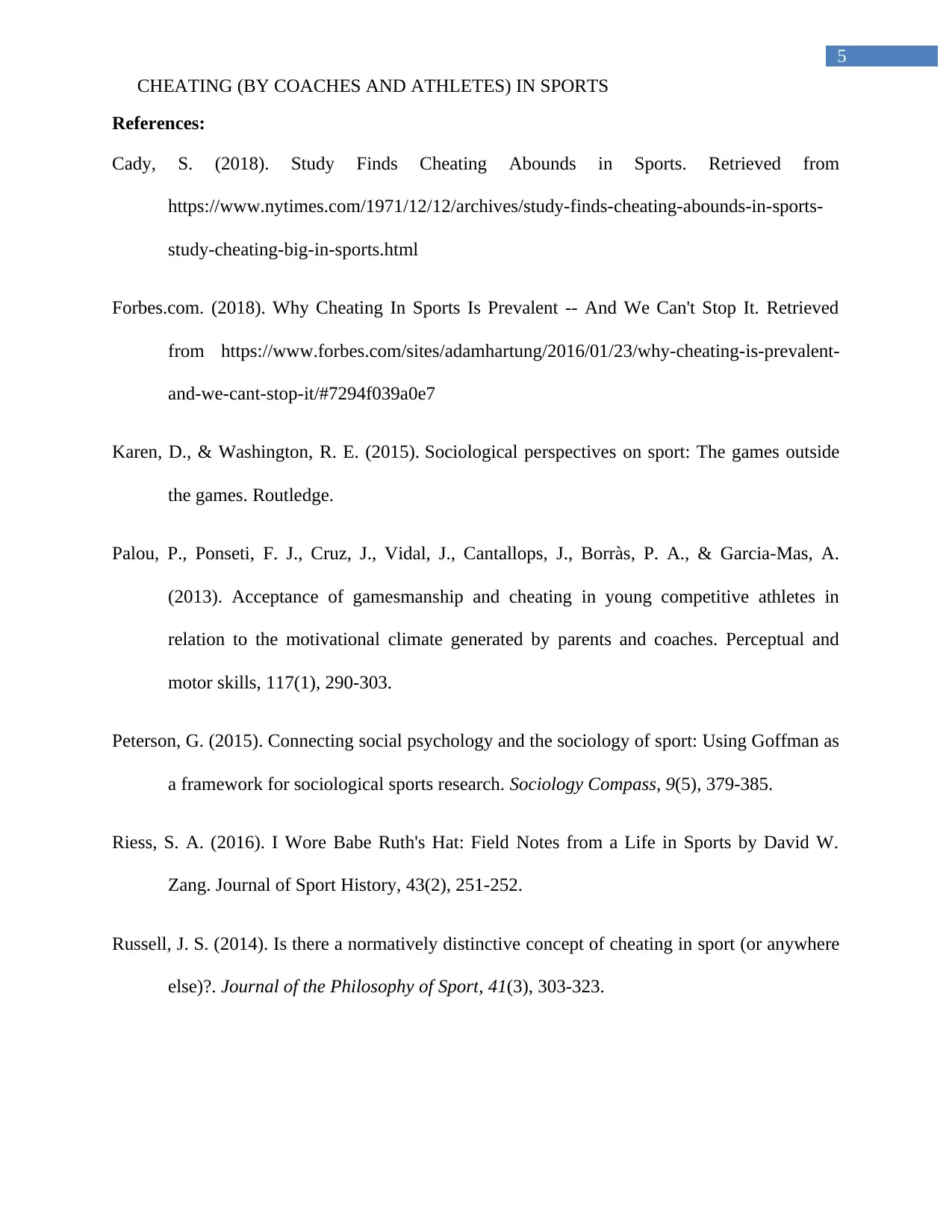
5
CHEATING (BY COACHES AND ATHLETES) IN SPORTS
References:
Cady, S. (2018). Study Finds Cheating Abounds in Sports. Retrieved from
https://www.nytimes.com/1971/12/12/archives/study-finds-cheating-abounds-in-sports-
study-cheating-big-in-sports.html
Forbes.com. (2018). Why Cheating In Sports Is Prevalent -- And We Can't Stop It. Retrieved
from https://www.forbes.com/sites/adamhartung/2016/01/23/why-cheating-is-prevalent-
and-we-cant-stop-it/#7294f039a0e7
Karen, D., & Washington, R. E. (2015). Sociological perspectives on sport: The games outside
the games. Routledge.
Palou, P., Ponseti, F. J., Cruz, J., Vidal, J., Cantallops, J., Borràs, P. A., & Garcia-Mas, A.
(2013). Acceptance of gamesmanship and cheating in young competitive athletes in
relation to the motivational climate generated by parents and coaches. Perceptual and
motor skills, 117(1), 290-303.
Peterson, G. (2015). Connecting social psychology and the sociology of sport: Using Goffman as
a framework for sociological sports research. Sociology Compass, 9(5), 379-385.
Riess, S. A. (2016). I Wore Babe Ruth's Hat: Field Notes from a Life in Sports by David W.
Zang. Journal of Sport History, 43(2), 251-252.
Russell, J. S. (2014). Is there a normatively distinctive concept of cheating in sport (or anywhere
else)?. Journal of the Philosophy of Sport, 41(3), 303-323.
CHEATING (BY COACHES AND ATHLETES) IN SPORTS
References:
Cady, S. (2018). Study Finds Cheating Abounds in Sports. Retrieved from
https://www.nytimes.com/1971/12/12/archives/study-finds-cheating-abounds-in-sports-
study-cheating-big-in-sports.html
Forbes.com. (2018). Why Cheating In Sports Is Prevalent -- And We Can't Stop It. Retrieved
from https://www.forbes.com/sites/adamhartung/2016/01/23/why-cheating-is-prevalent-
and-we-cant-stop-it/#7294f039a0e7
Karen, D., & Washington, R. E. (2015). Sociological perspectives on sport: The games outside
the games. Routledge.
Palou, P., Ponseti, F. J., Cruz, J., Vidal, J., Cantallops, J., Borràs, P. A., & Garcia-Mas, A.
(2013). Acceptance of gamesmanship and cheating in young competitive athletes in
relation to the motivational climate generated by parents and coaches. Perceptual and
motor skills, 117(1), 290-303.
Peterson, G. (2015). Connecting social psychology and the sociology of sport: Using Goffman as
a framework for sociological sports research. Sociology Compass, 9(5), 379-385.
Riess, S. A. (2016). I Wore Babe Ruth's Hat: Field Notes from a Life in Sports by David W.
Zang. Journal of Sport History, 43(2), 251-252.
Russell, J. S. (2014). Is there a normatively distinctive concept of cheating in sport (or anywhere
else)?. Journal of the Philosophy of Sport, 41(3), 303-323.
⊘ This is a preview!⊘
Do you want full access?
Subscribe today to unlock all pages.

Trusted by 1+ million students worldwide
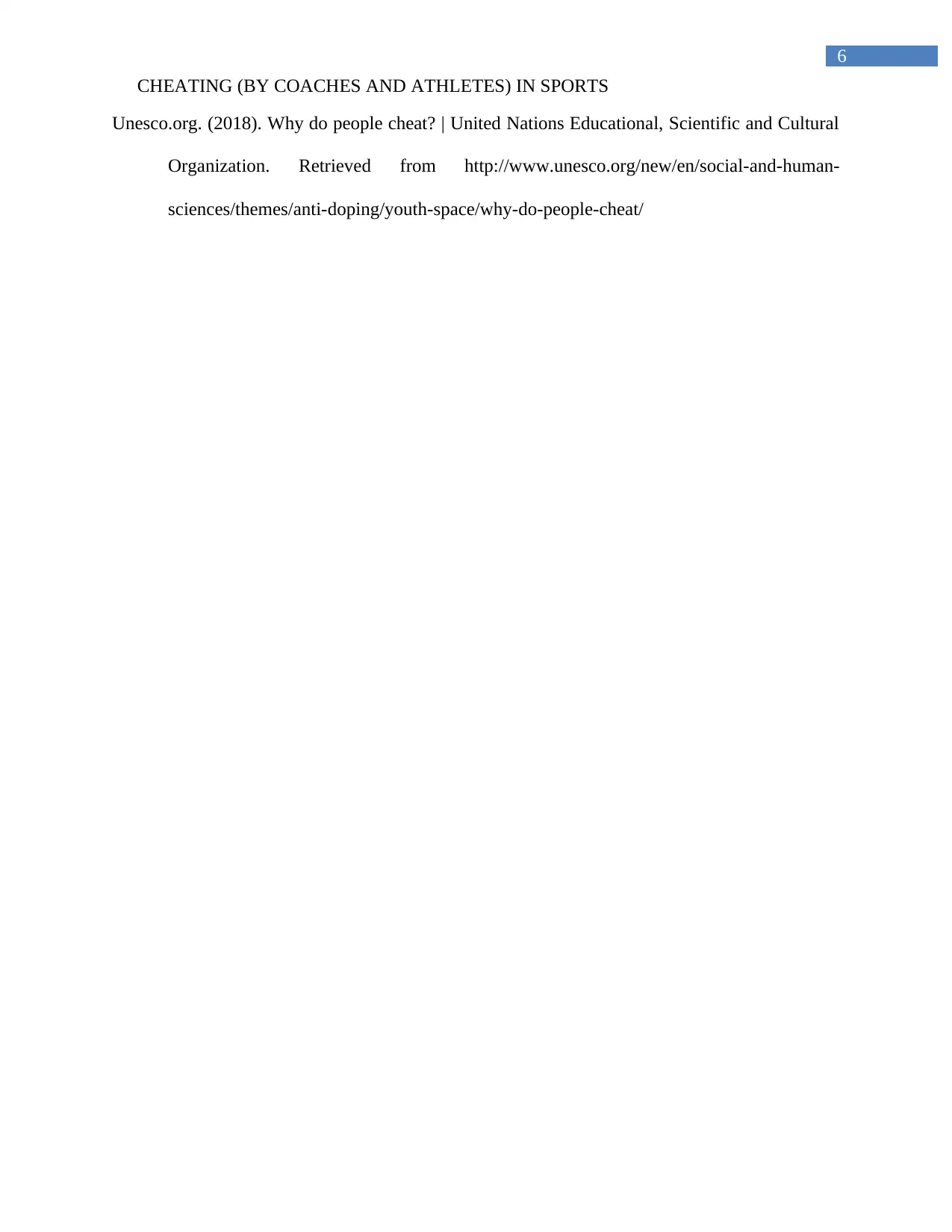
6
CHEATING (BY COACHES AND ATHLETES) IN SPORTS
Unesco.org. (2018). Why do people cheat? | United Nations Educational, Scientific and Cultural
Organization. Retrieved from http://www.unesco.org/new/en/social-and-human-
sciences/themes/anti-doping/youth-space/why-do-people-cheat/
CHEATING (BY COACHES AND ATHLETES) IN SPORTS
Unesco.org. (2018). Why do people cheat? | United Nations Educational, Scientific and Cultural
Organization. Retrieved from http://www.unesco.org/new/en/social-and-human-
sciences/themes/anti-doping/youth-space/why-do-people-cheat/
1 out of 7
Your All-in-One AI-Powered Toolkit for Academic Success.
+13062052269
info@desklib.com
Available 24*7 on WhatsApp / Email
![[object Object]](/_next/static/media/star-bottom.7253800d.svg)
Unlock your academic potential
Copyright © 2020–2025 A2Z Services. All Rights Reserved. Developed and managed by ZUCOL.